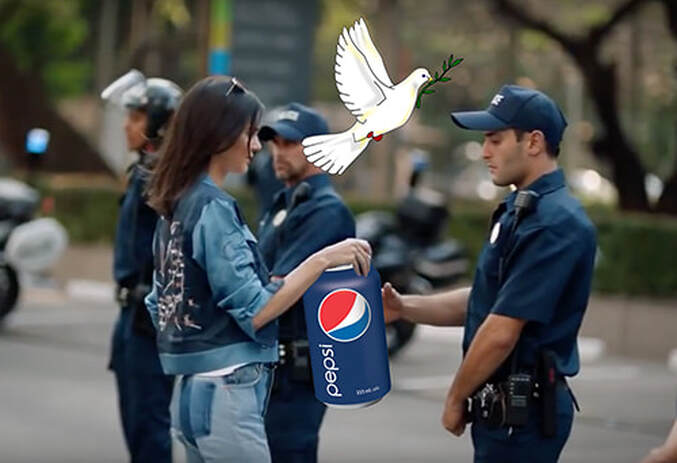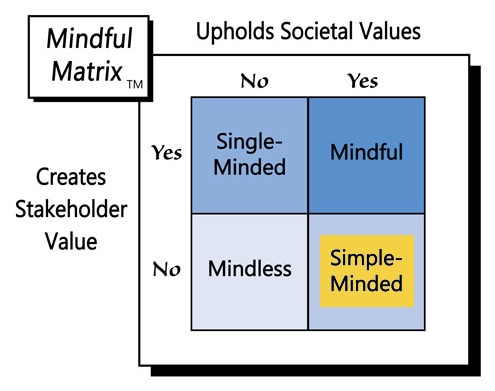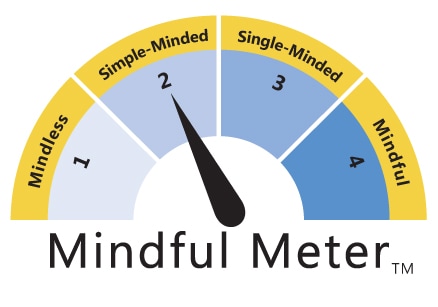The two-and-a-half-minute video depicts some kind of protest—it’s hard to tell what. A throng of broadly diverse, yet uniformly young and attractive, activists take to the streets carrying signs with such ambiguous messages as “Love” and “Join the Conversation.” They look more amiable than angry.
The growing crowd captures Jenner’s attention even as she’s immersed in a photoshoot. Eventually the populace appeal becomes too great: She pulls off her bleach-blond wig, wipes off a layer of red lipstick and joins the people in protest.
As she strides in solidarity, an idea strikes her. She grabs a can of Pepsi from a conveniently located container and confidently approaches a handsome young policeman, standing guard during the dispute. The officer accepts Jenner’s gesture, cracks open the can, and takes a swig. His smile and “awe shucks” reaction causes the crowd to erupt in elation. Problem solved, the commercial closes with the Pepsi logo and the tagline “Live Bolder. Live Louder. Live for Now.”
Pepsi’s ad appeared well-intended, so why the strong social media backlash and the skewering on Saturday Night Live? By handing the can of Pepsi to the policeman, Jenner seemed to be extending an olive branch. Many people and entire nations have used gifts in similar ways to promote peace, e.g., China’s gift of giant pandas Ling-Ling and Hsing-Hsing to the U.S. in 1972; the U.S. reciprocated with a set of musk oxen.
Of course, there’s a big difference between a pair of majestic animals and a can of cola, but Jenner’s ad wasn’t the first advertising that presented soda as a means of mending. In the classic 1979 Super Bowl commercial that ranks as one of the best of all time, a young Pittsburgh Steelers fan innocently offered an injured “Mean Joe Greene” his bottle of Coke, lifting the dejected defensive tackle’s mood and leading him to toss his jersey to the elated lad: “Hey, kid; catch.”
That iconic and still very popular ad ended with the tagline “Have a Coke and a Smile,” which is exactly what millions of people did. Coca-Cola saw a 19.2% increase in sales from 1979 to 1980, not all due to the commercial, but the ad undoubtedly played a part.
So why did people spurn Pepsi’s Jenner ad when Coke’s Mean Joe commercial was so successful? There are two related reasons:
1. Believability
The storyline of the Mean Joe ad was plausible and its filming was realistic. Granted it was still somewhat of a fantasy—not every fan who approaches a famous athlete receives such a generous response; yet, even today, we hear of instances in which kind-hearted sports stars very pleasantly surprise their followers. For instance, at the recent Masters tournament, Matt Kuchar hit a hole-in-one from the 16th tee, signed the ball, and gave it to an ecstatic young fan.
In contrast, so much about the Jenner ad seemed implausible or looked unreal: What are the chances that Jenner would be doing a street-level photoshoot exactly where a protest pops up? How likely is it that someone of Kardashian fame would spontaneously join the march because a passerby caught her attention and motioned her in? What’s the probability that a police officer in such a tense situation would accept a soda from a stranger, drink it, and flash that kind of silly smile? Plus, there’s the inauthentic appearance of the protesters and their peculiar signs.
2. Reasonable Purpose
Certainly, both Coke and Pepsi wanted their commercials to sell soda. Whether or not it was intended, the Mean Joe ad also served to promote empathy and kindness, even between individuals of different ages and races. Initiated by an innocent child, that purpose was plausible. Even now, if any of us would politely offer a cold drink to a thirsty stranger, we’d probably receive a similar warm response.
Jenner kindly offered a cold Pepsi, but the viewing audience overwhelming rejected her efforts—why? Part of the reaction stems from the spot’s farfetched features, described above. Moreover, the ad tried to do too much. Soda can legitimately support positive interpersonal interaction, as it did for Coke. Pepsi, however, seriously over-projected its influence, thinking that a cola could curb civil unrest or enact social justice. Such issues are too big and complex, even for Mean Joe to tackle in an ad.
Those who see Pepsi’s failed ad as an ill-advised attempt to profit from the struggles of real protestors can rightly call the company’s advertising “Mindless.” However, if we give the cola maker the benefit of the doubt and believe that it really wanted to support positive change, we might view the ad as an ineffective yet well-intended example of “Simple-Minded Marketing.”
Learn more about the Mindful Matrix and Mindful Meter.
Check out Mindful Marketing Ads and Vote your Mind!




 RSS Feed
RSS Feed